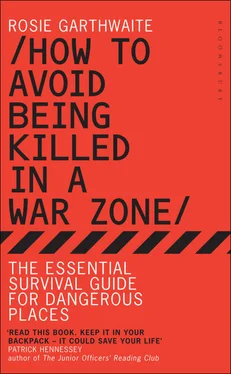‘I guess the first way to prevent yourself getting pregnant is by not having sex. But in stressful situations with not much other than work to do, an affair is a good way of letting off steam and doesn’t give you such a hangover as whisky, although it can have more serious consequences if you aren’t careful.
‘Not getting pregnant is pretty straightforward. Use a condom. Always carry condoms with you. Many of the countries mentioned in this book are rife with HIV. You want to come back with good stories, not a lethal STD.
‘If something does go wrong, the morning-after pill is readily available practically everywhere – even up a mountain. You might get a few odd looks when you ask for it, but don’t let that put you off.
‘I think a greater danger than getting pregnant is getting trapped in a relationship that is furtive and ultimately unsustainable in conservative countries. It hasn’t ever, in my experience, ended happily. How do you avoid it? Don’t stay up late talking when there is a power cut. Don’t go on trips to remote, romantic places in the countryside. Don’t pick apart your personal stories and histories on walks in deserted gardens.
‘Avoid married men, especially if they are married to their cousins. Avoid men with girlfriends. Avoid your translator. Above all, avoid your boss, especially if their father happens to be a head mullah or something like that.’
The morning-after-pill is available in the UK and many other countries as an advance prescription. This means that you can hold up to three packets of the emergency pill in anticipation of a burst condom or accidental lapse in contraception. It is available for purchase from certain pharmacies both in store and online, and in the UK is also available free from family planning clinics and GPs at the doctor’s discretion.
Warning:Do not use the morning-after pill as a regular method of contraception. It is a heavy dose of hormones that can cause side effects in some women.
In most places you can buy anything you need in the way of sanitary towels or tampons from a pharmacy, but if you are in a place with no pharmacy, there are some other options. Ask women locally for advice. My experience has been that people who live with less modern amenities tend to be very open in talking about the mechanics of the body – periods, pee and lots of diarrhoea! It is a good idea to pack your own toilet roll or baby wipes. In many places there will be only water to wash yourself after a trip to the loo, and it can get messy if you are not practised.
Delaying a period
There are bound to be times when it is more inconvenient than usual to have a period, so it’s worth knowing how to delay one. There is no failsafe way of doing it, but you could try one of two methods.
1. Running packets of the contraceptive pill together
This method is more effective if you have been established on the pill for a while. Check with your doctor or nurse about the best way to do this with your brand of pill. For most pill types, you can run up to three pill packets together without a break. This is known as tricycling.
Fixed-dose pill (all the active pills in the packet are the same):Simply take up to three packets one after the other without the pill-free interval.
Phasic pill (two or three different types of active pills in one packet):Running packets together can result in breakthrough bleeding, but this will not reduce the efficacy of the contraception. Consult your nurse or doctor for advice.
Packets containing seven dummy pills (in a packet of 28):If you know for sure which the dummy pills are, you can throw them away and start the next packet of real pills. If you are unsure, read the instructions or check with your doctor or a pharmacist.
2. Taking norethisterone
This is a synthetic hormone similar to naturally occurring sex hormones. It is available only on prescription and is not guaranteed 100 per cent effective. If you want to try it, you should consult your doctor before your trip to check that it is suitable for you and to issue a prescription.
The usual dosage is 5 mg of norethisterone three times daily, starting three days before the anticipated onset of a period. Menstruation will occur 2–3 days after you stop taking it.
Note that norethisterone is not a form of contraception.
Perhaps inevitably, there are some risks involved in taking norethisterone. The main one is the risk of developing deep-vein thrombosis (DVT). You should not take this medication if you are at high risk or have a strong family history of DVT. Other side effects of norethisterone include migraine. Always read the label and consult a doctor before taking this.
Sanitary protection
What do you do if your bag containing all your spare stuff for periods gets stolen? What if you run out of tampons in the remoter parts of some Muslim countries, where they are as hard to find as hen’s teeth?
Since the ancient Egyptians invented the first tampons – made from softened papyrus – life for women has become considerably easier. Hippocrates recorded in the 5th century BC that Greek women were improvising with lint wrapped around bits of wood – sounds scratchy! The modern tampon with handy applicator was actually invented in 1929 by a man, Dr Earle Haas. He called his trademarked device Tampax, but then sold the company to a lady called Gertrude Tendrich, who made all the money.
The great lesson from all this is that women survived for millennia without the modern conveniences we take for granted. Indeed, in many of the wilder places you might be visiting today, women make do with very little. And so can you. The key thing is to do it safely and cleanly, planning in advance if possible.
Sanitary towelsare by far the most common period product available globally, although many forms in remote places seem more akin to mattresses than pads. As many a maiden in distress will know, alternatives can easily be fashioned out of toilet paper, cloth or kitchen roll.
Tamponsare generally harder to find, but fashioning alternatives to them is not impossible, as the women in ancient Egypt demonstrated. Anecdotes from adventurous ladies caught in extremis recommend the temporary use of alternatives such as a rolled-up wad of toilet paper or kitchen roll (verdict: rather dry). Or a rolled-up wad of clean medical dressing.
I lived with a similar ad hoc method to this for four months in Basra. It worked, but I blessed the BBC girl who gave me all her leftover goodies when she was heading back up to Baghdad. I probably could have found tampons if I’d asked locally, but given that my translator was a man… I was a wimp.
However, a few notes of warning are necessary:
• Always use clean materials.
• These improvised items are harder to remove than a normal tampon.
• Keep them in for a shorter time and replace with a proper tampon as soon as possible.
• They are unlikely to be sterile, therefore increasing the risk of toxic shock syndrome (potentially a very serious infection).
Can you use two tampons at once?Officially, the manufacturers of Tampax ®advise against this. However, for heavy flow, many women have used this method without mishap.
How long can a tampon stay in?The official answer to this is eight hours. The longer the tampon remains inside, the greater the risk of developing toxic shock or pelvic infection. For legal reasons, we cannot advocate exceeding this limit. However, anyone who has slept longer than eight hours in a night will know that there is some flexibility in terms of time. Use your judgement.
Читать дальше




![Джонатан Димблби - Barbarossa - How Hitler Lost the War [calibre]](/books/385421/dzhonatan-dimblbi-barbarossa-how-hitler-lost-the-w-thumb.webp)







